Responsibility in Sitra’s investment activities
Sitra invests its assets responsibly and profitably. For Sitra, responsible investment means considering not only return and risk but also environmental, social and governance (ESG) factors in all investment decisions.
Sitra’s responsible investment activities are based on the UN Principles for Responsible Investment (PRI), which Sitra signed in 2015. The Global Compact principles are another international framework.
The practical implementation is based on the Guidelines for Responsible Investment approved by Sitra’s Board of Directors, which was last updated in 2022.
Funds and responsible investment
Sitra’s investments are mainly implemented through funds. Fund investments are managed by external asset managers who carry out individual investment analyses and select investment targets. The minimum requirement is that the asset manager has signed the PRI or has another responsible investment policy.
All Sitra’s asset managers managing listed equity and fixed income funds, as well as real estate, forestry and infrastructure funds, have signed the PRI principles (Figure 1). These asset managers manage 95 % of the value of Sitra’s investments.

A significant number of our asset managers and funds have set a net-zero target. Several asset managers have also pledged their commitment to the Net Zero Asset Manager Initiative (NZAMI), which aims for carbon-neutral investments by 2050. Among asset managers for listed investments, nearly all have committed to this initiative, whereas only a minority of asset managers for unlisted investments have done so.
Our asset managers are also dedicated to numerous other initiatives that promote responsible investment. The most popular of these include the UN Global Compact, Climate Action 100+, Nature Action 100, and various asset class-specific initiatives such as GRESB, BREEAM, and FSC.
The EU Regulation on sustainability-related disclosures in the financial services sector (Sustainable Finance Disclosure Regulation, SFDR) entered into force in 2021. It classifies fund products into three categories according to their level of sustainability and obligates asset managers to disclose which category each fund belongs to.
So far, no minimum requirements have been set for Sitra’s funds in terms of SFDR. The SFDR ratings of the funds are shown below according to their market value (Figure 2).
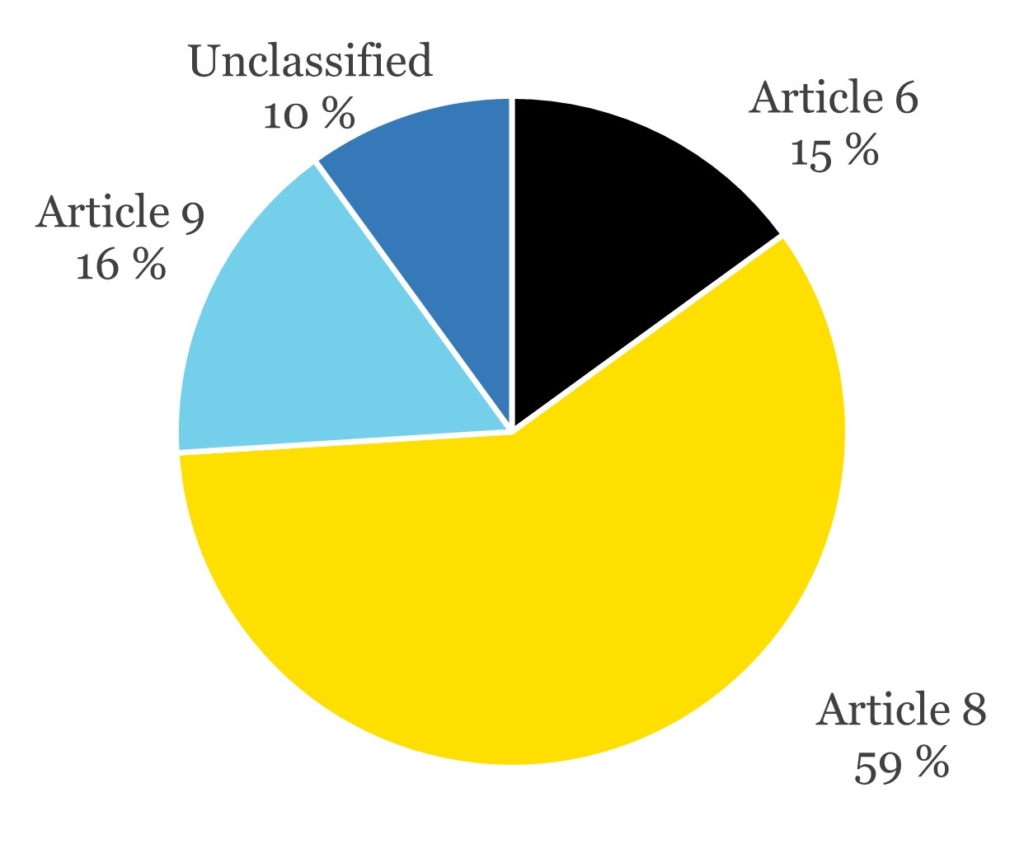
Most of the funds in Sitra’s portfolio fall under the Article 8 category, meaning they promote sustainability-related factors as part of their investment processes. Article 6 funds, on the other hand, are not required to integrate sustainability as a core component of their investment approach. The most responsible category is Article 9, which includes funds that actively aim to achieve sustainability-related objectives. The distribution of funds remained nearly unchanged compared to the previous year.
Analytics firm MSCI has assessed Sitra’s fund investments in 2024. The overall ESG rating of the portfolio remained at AA, which is the second-highest rating. Most of the funds selected for the portfolio were classified as leaders, and there were no funds classified as laggards.
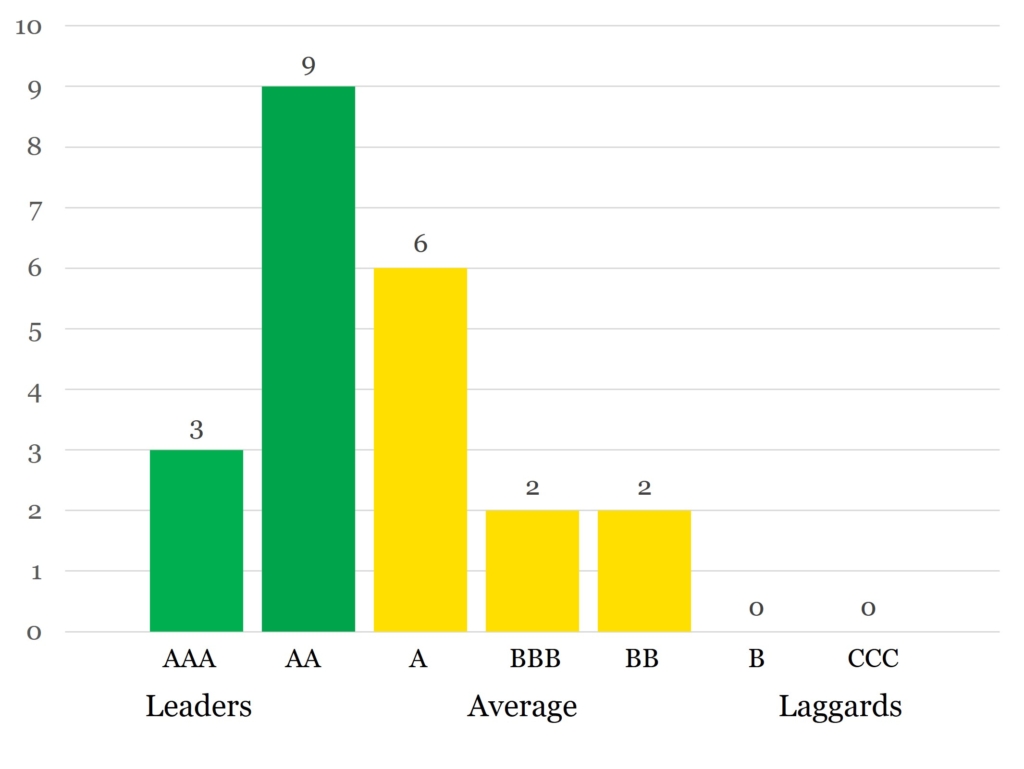
One of the development points of Sitra’s responsible investment is taking biodiversity into account. In 2023, we joined the international Nature Action 100 initiative, in which committed investors demanded more ambition and action from large corporations to halt biodiversity loss. Additionally, starting from the 2024 financial year, we will report on Sitra’s nature-related investment risks and opportunities in accordance with the guidelines of the Taskforce on Nature-related Financial Disclosures (TNFD).
Engagement
As a fund investor, Sitra can influence its investments through discussions with asset managers. If engagement does not lead to improvement, the last resort is to sell the fund holding. ESG issues continued to be on the agenda in most fund manager meetings in 2024.
Sitra’s industry and norm violation screening is based on MSCI’s reporting, which covers Sitra’s listed equity and fixed income funds. In 2024, industry-related exclusions were successfully implemented in all funds. Potential serious norm violations were identified in three portfolio companies. These companies are currently the focus of engagement efforts or are under further investigation.
Unlisted investments (real estate, infrastructure, private debt, private equity, and venture capital) are reviewed annually based on the reports submitted by asset managers. No deviations from Sitra’s industry restrictions were observed. The lack of access to information, especially in the private equity and venture capital asset classes, poses a challenge for an in-depth examination of sustainability issues. Asset managers are aware of these shortcomings and reporting is constantly evolving.
Sitra has been a support member of the Climate Action 100+ project since 2020. This project encourages companies to meet emission reduction targets in line with the Paris Agreement and to report on the risks posed by climate change to businesses.
Responsible investing facing headwinds worldwide
In recent times, responsible investing based on ESG criteria has been challenged by various factors, sparking debate among investors. One significant challenge is the lack of standardization and comparability in ESG metrics, which complicates investors’ ability to assess and compare different investment opportunities. Additionally, increasing demands for transparency and responsibility require companies to provide more detailed reporting on environmental and social accountability, which can lead to higher costs and administrative burdens.
Anti-ESG sentiment has been gaining traction especially in the United States, influencing asset managers to withdraw from several investor initiatives. For instance, the Net Zero Asset Managers Initiative (NZAMI) has paused its activities, leading to uncertainty and challenges in responsible investing. These events underscore the need for clear guidelines and reliable metrics to support investors’ decision-making and advance responsible investing.
Despite these challenges, ESG investing remains a growing trend, with many investors viewing it as a critical strategy for achieving both long-term returns and sustainable development.
Survey for Asset Managers: Progress in Sustainability Reporting
In 2024, Sitra conducted an ESG survey among asset managers to gain deeper insights into the implementation of sustainability within our investments. The survey results indicate that asset managers have made significant progress in both sustainability reporting and implementation. Setting and reporting on climate targets has improved notably, aligning closely with Sitra’s climate strategy.
According to the survey, asset managers have actively worked to reduce the carbon footprint of their investments and have adopted international reporting frameworks, such as the recommendations of the TCFD. While challenges remain, particularly in the coverage and depth of reporting, asset managers have demonstrated a strong commitment to continuous improvement. This progress is encouraging and supports Sitra’s efforts to advance sustainable and responsible investment practices.
Climate targets
Climate change mitigation is one of Sitra’s most important sustainability goals, and we support, among others, the goals of the Paris Agreement.
Sitra’s climate strategy for investments was published in spring 2021, and it was updated in 2023. The long-term objective is that all Sitra’s investments are in line with the Paris Agreement. The concrete objective is to achieve carbon-neutral investment portfolio by 2035 in accordance with Finland’s national target, provided that the investment environment enables the transition.
In reporting and analysing climate risks, we utilise the international TCFD reporting recommendation and framework (Task Force on Climate-related Financial Disclosures). The TCFD is an international reporting recommendation that instructs companies to report consistently on the financial risks and opportunities of climate change. According to the recommendation, it is important to determine the carbon footprint of investments, assess fossil fuel reserves and low- and high-carbon-emitting investments, as well as monitor the implementation of carbon emission limits in accordance with international climate agreements.
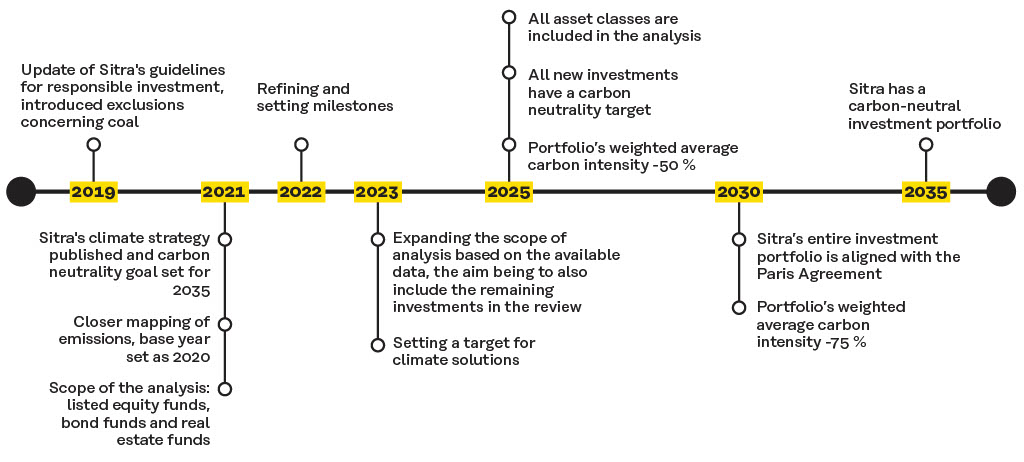
1. Carbon footprint
The climate impacts and risks of Sitra’s investments are mainly measured using the carbon footprint. Currently, the most important measure is weighted average carbon intensity, which measures the carbon-equivalent emissions of investees relative to their turnover and weighted by the market value of the investments.
Carbon footprint and intensity numbers include emissions from the company’s own operations (scope 1) and indirect emissions related to purchased energy (scope 2). Indirect emissions (scope 3) are also reported, but no reduction targets have yet been set for them due to the related uncertainty.
In the short term, Sitra’s goal is to significantly reduce the carbon intensity of its investment portfolio and to remain below the benchmark index. The goal is that the carbon intensity of Sitra’s investments will be at least 50 % lower in 2025 than in the reference year 2020. The corresponding target for 2030 is 75 %.
At the end of 2024, the weighted carbon intensity of all Sitra’s listed investments was 76 tCO2e/M€ revenue. The positive trend has continued, and the 50 % reduction target set for 2025 was achieved ahead of schedule.
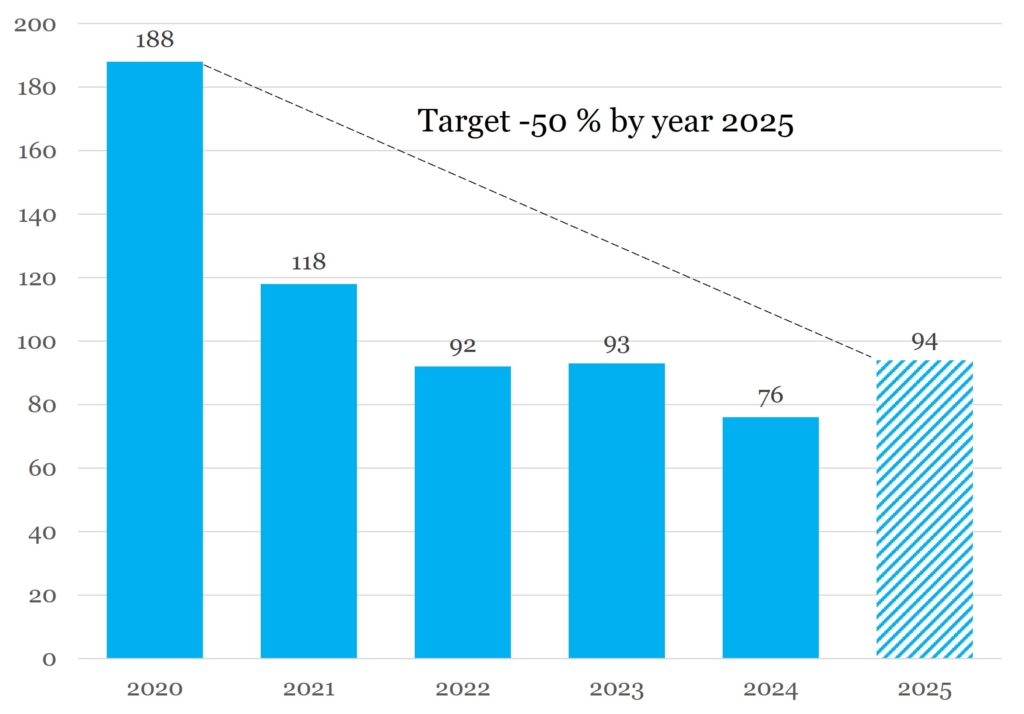
The funded emissions of listed investments decreased by approximately 34 % compared to the previous year. Through MSCI, we can calculate absolute emissions for approximately 53 % of the value of the entire portfolio, although there is still significant uncertainty related to the figures, especially regarding scope 3 emissions.
2. Financing climate solutions
One important tool in mitigating climate change is funding climate solutions. Climate solutions refer to investing in targets which produce solutions enabling emission reductions and take the progress of climate change into account in their activities. There is currently no clear and universally accepted definition for climate solutions.
Currently, the number of climate solutions in listed investments is measured by the so-called green revenue, which is the share of green revenue in companies’ total revenue, weighted by the market value of the investment.
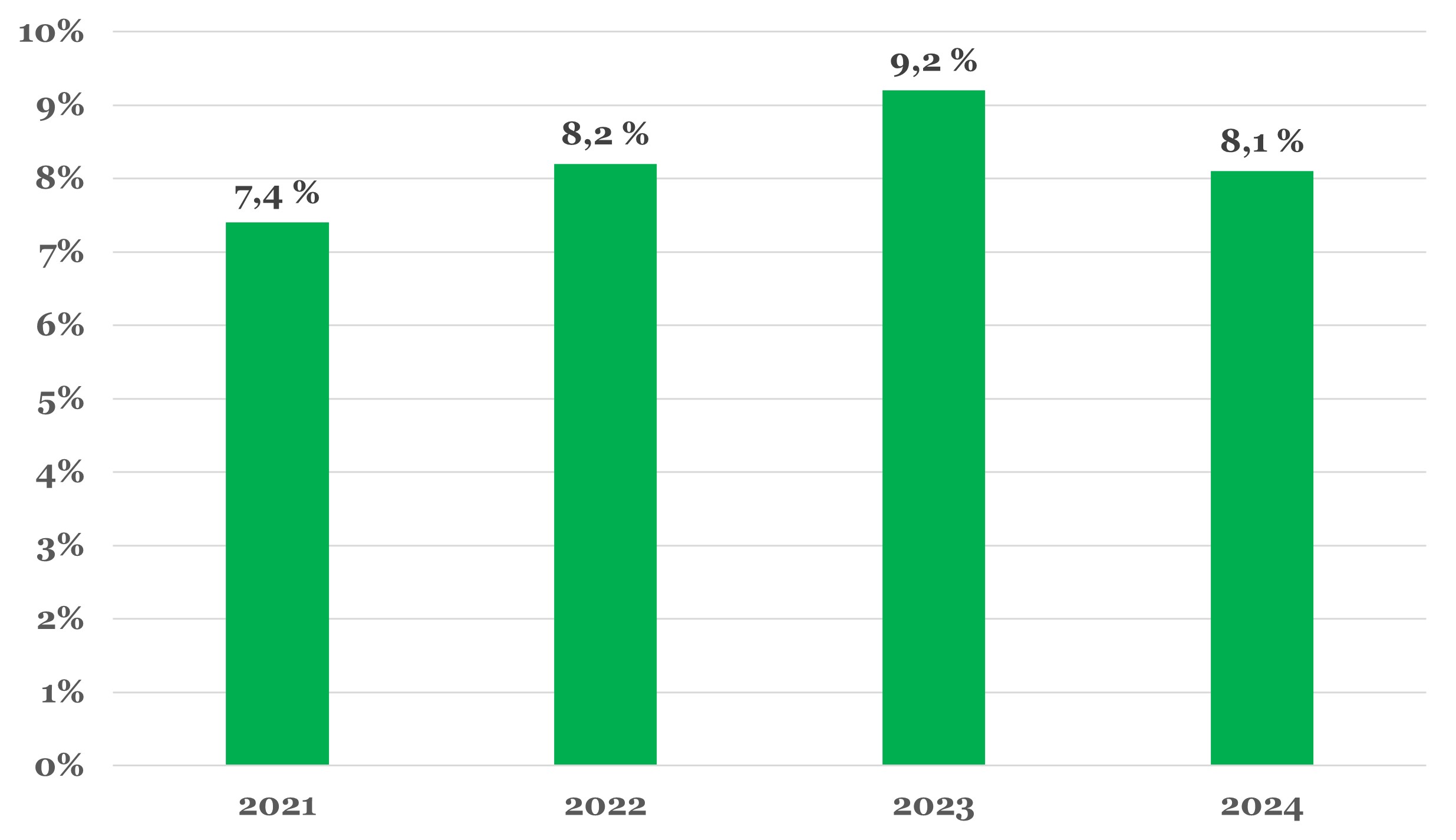
The growth in the share of green business leveled off in 2024, accounting for approximately eight percent of the market value of investments. The annual variation in this share is influenced by, among other factors, fluctuations in companies’ market values and changes in portfolio allocation. In addition to listed investments, Sitra’s portfolio includes a significant amount of other financing for climate solutions, such as renewable energy infrastructure investments, sustainable forestry investments, certified real estate investments and venture capital investments in companies developing climate solutions. However, commensurate reporting on these is not yet available.
Biodiversity
Biodiversity is a development target for Sitra’s responsible investment. Like climate risks, biodiversity loss can also affect investment portfolios regardless of asset type, sector and geographical area.
This year, we are reporting for the first time on Sitra’s nature-related investment risks and opportunities. The report covers the fiscal year 2024 and was conducted in accordance with the so-called TNFD recommendations. Download the report: Combined TCFD and TNFD Disclosure Report 2024.
We are continuously strengthening our expertise in ESG topics. In the autumn, members of the investment team participated in training organized by Sitra, focusing on the application of the TNFD framework in financial and investment decision-making. The training, aimed at Finnish financial professionals, consisted of a series of workshops attended by over 60 investors and asset managers.
Disclaimer: Although Sitra’s information providers, including without limitation, MSCI ESG Research LLC and its affiliates (the ”ESG Parties”), obtain information (the ”Information”) from sources they consider reliable, none of the ESG parties warrants or guarantees the originality, accuracy and/or completeness, of any data herein and expressly disclaim all express or implied warranties, including those of merchantability and fitness for a particular purpose. The Information may only be used for your internal use, may not be reproduced or redisseminated in any form and may not be used as a basis for, or a component of, any financial instruments or products or indices. Further, none of the Information can in and of itself be used to determine which securities to buy or sell or when to buy or sell them. None of the ESG Parties shall have any liability for any errors or omissions in connection with any data herein, or any liability for any direct, indirect, special, punitive, consequential or any other damages (including lost profits) even if notified of the possibility of such damages.

